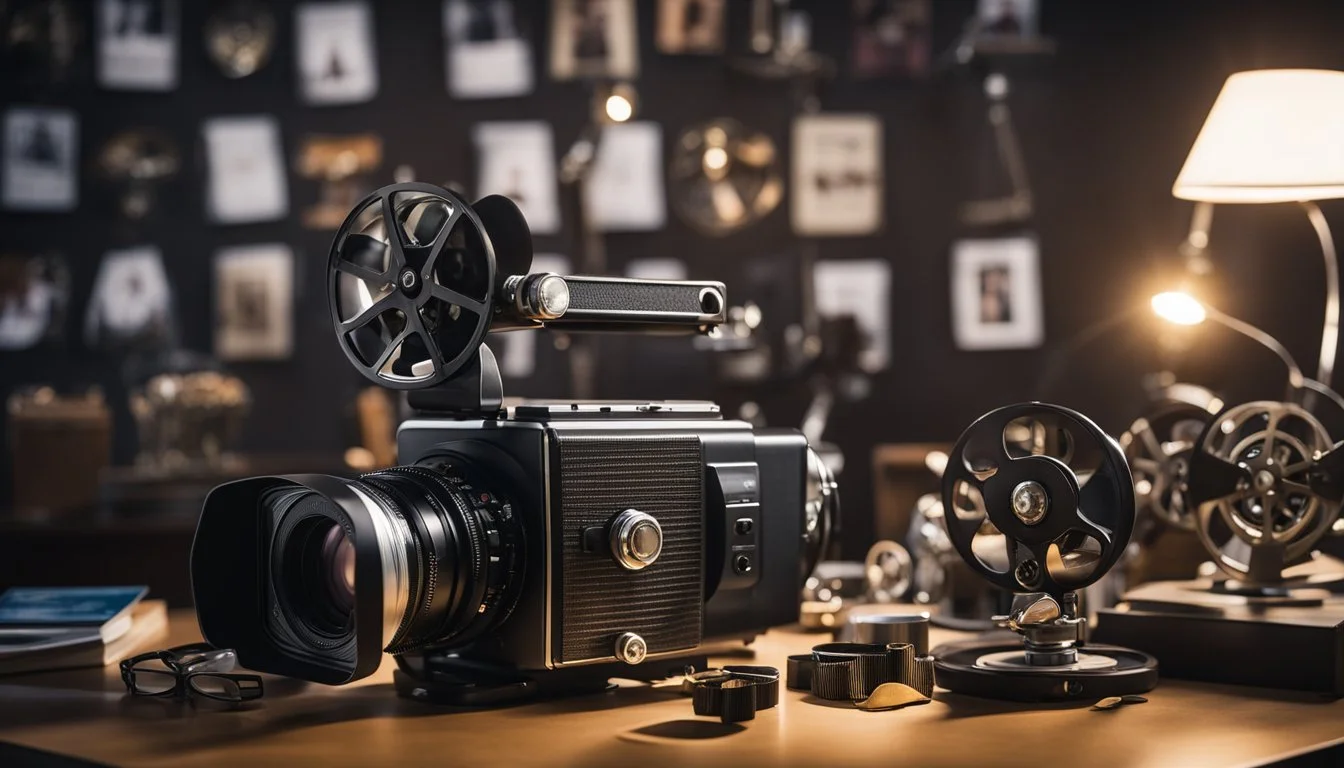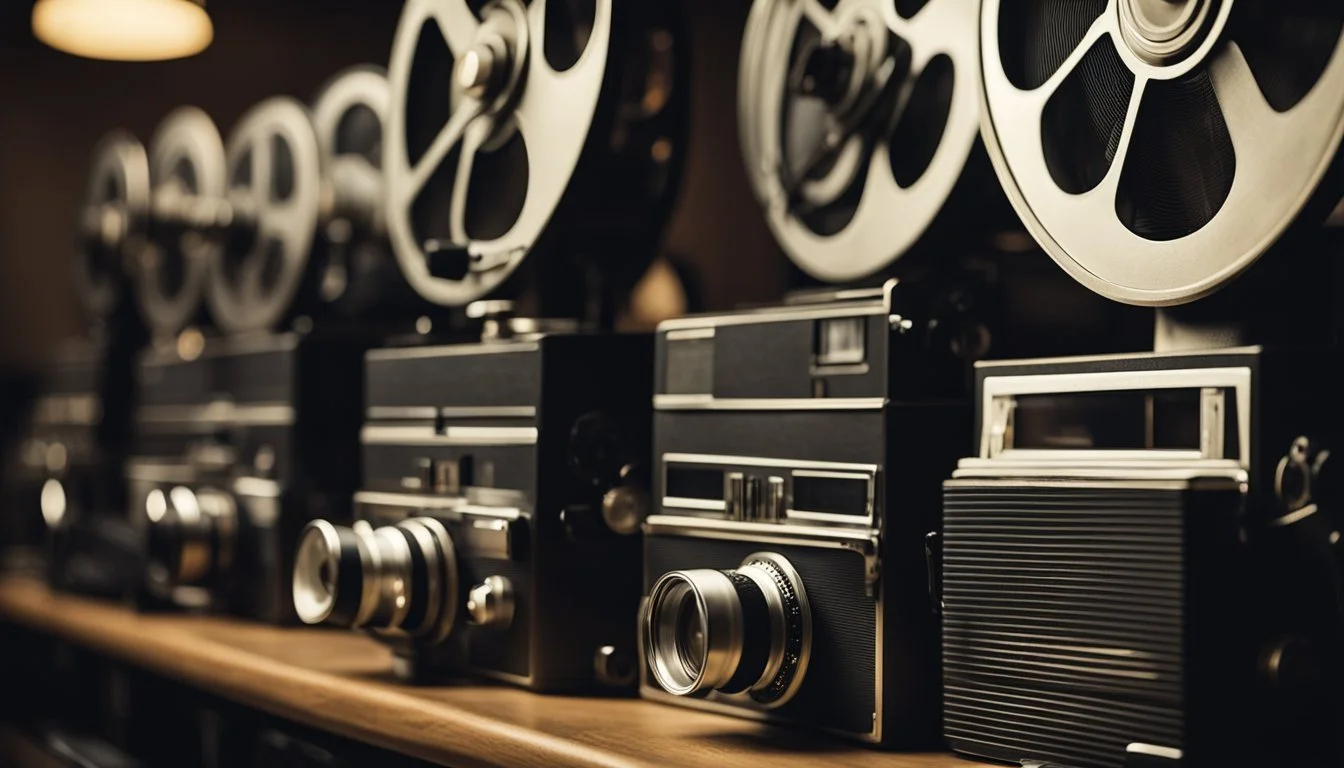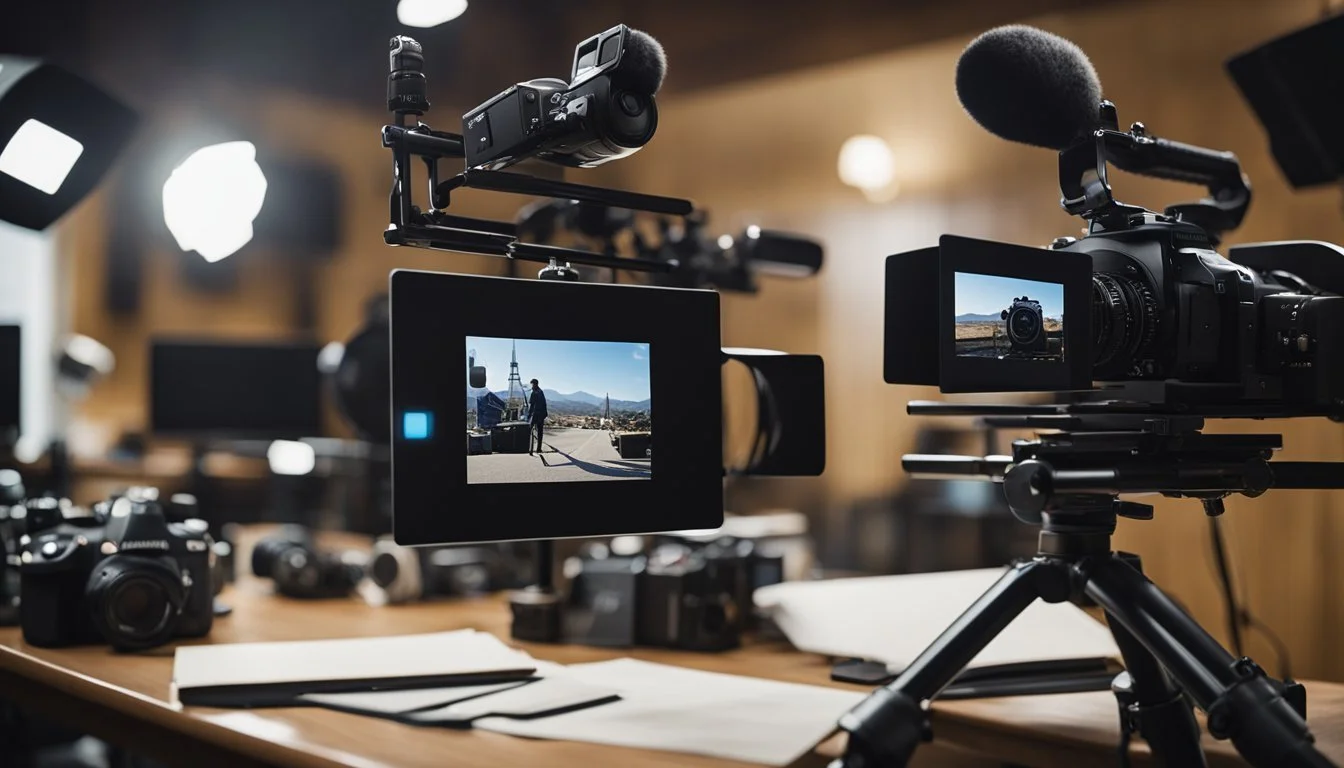12 Must-Watch Documentaries About the Art of Filmmaking
Essential Viewing for Cinephiles
Documentaries provide a unique lens into the world of filmmaking, revealing the intricate processes and creative struggles behind the scenes. These films offer an in-depth look at the dedication, ingenuity, and challenges faced by directors, actors, and crew members as they bring stories to life on the big screen.
Whether you are an aspiring filmmaker or simply a cinema enthusiast, these documentaries are essential viewing for gaining a deeper appreciation of the craft. Through candid interviews, on-set footage, and personal anecdotes, these films capture the passion and perseverance required to create memorable cinematic experiences.
1) Jiro Dreams of Sushi
"Jiro Dreams of Sushi" is a 2011 documentary film directed by David Gelb.
It highlights the life and art of Jiro Ono, an 85-year-old sushi master.
Jiro Ono is the owner of Sukiyabashi Jiro, a renowned 10-seat, sushi-only restaurant in a Tokyo subway station.
The film delves into Jiro's dedication to his craft.
His relentless pursuit of perfection has influenced chefs globally.
Featuring interviews and day-to-day operations, viewers get a unique insight into the meticulous process of sushi preparation.
Jiro's commitment to his work is evident in every scene.
The documentary not only showcases culinary excellence but also offers a glimpse into Japanese culture.
The precision, discipline, and passion of Jiro have set standards in the culinary world.
Sukiyabashi Jiro was previously awarded three Michelin stars, reflecting its high reputation.
"Jiro Dreams of Sushi" serves as an inspiration for anyone interested in mastering their craft.
2) Exit Through the Gift Shop
Directed by the elusive street artist Banksy, "Exit Through the Gift Shop" is a compelling 2010 documentary. It explores the world of street art through the lens of Thierry Guetta, a French immigrant in Los Angeles.
Thierry Guetta begins his journey as an amateur filmmaker who documents various street artists. He becomes deeply involved with the likes of Shepard Fairey and Banksy himself.
Guetta's obsessive documentation results in hundreds of hours of chaotic, unorganized footage. Banksy eventually steps in and uses this raw material to create the documentary.
Guetta's transformation from filmmaker to the eccentric artist known as Mr. Brainwash is fascinating. He turns his passion for street art into a full-blown career, challenging the boundaries between art and hype.
The film captures the subversive and often secretive nature of street art. It also raises questions about authenticity, the art market, and the role of the artist in modern society.
"Exit Through the Gift Shop" provides a unique insider's look at the graffiti subculture. It stands out as a must-watch documentary for anyone interested in the intersections of art, rebellion, and commercialism.
3) The Great Buster: A Celebration
Directed by Peter Bogdanovich, "The Great Buster: A Celebration" offers an insightful look into the life and career of Buster Keaton. Keaton, one of the most influential comedians in American cinema, is celebrated through archival footage and interviews.
The documentary traces Keaton's journey from a vaudeville performer to a silent film star. Using a mix of historical clips and expert commentary, it highlights his groundbreaking work in physical comedy.
Keaton's innovations in filmmaking, including his daring stunts and meticulous attention to detail, are examined. His techniques remain influential, showcasing his status as a trailblazer in the industry.
Viewers can appreciate Keaton’s unique style, characterized by his stoic expression and physical prowess. The film also touches upon his personal struggles and resurgence later in his career.
Through "The Great Buster: A Celebration," Bogdanovich pays tribute to Keaton's lasting legacy. The documentary serves as an essential viewing for those interested in the history and artistry of filmmaking.
4) Milius
"Milius" is a 2013 documentary film that offers an engaging look into the life and career of John Milius, a revered figure in Hollywood. Directed by Joey Figueroa and Zak Knutson, the film covers Milius's journey from his childhood, through his time at USC School of Cinema, to his notable works in the industry.
John Milius is best known for writing and directing influential movies like "Apocalypse Now," "Dirty Harry," and "Red Dawn." The documentary shines a light on his unique approach to storytelling and his passion for action-packed, heroic narratives.
The film also explores Milius's friendships with other legendary filmmakers such as George Lucas and Steven Spielberg. These relationships highlight his influential presence in 1970s and 1980s Hollywood.
"Milius" features interviews with key industry figures who share insights and anecdotes about his impact. The film also delves into his reputation as a "Zen anarchist" and his larger-than-life persona that inspired characters like Walter Sobchak in "The Big Lebowski."
This documentary is essential viewing for anyone interested in the intricacies of filmmaking and the vibrant personality of John Milius. It provides a comprehensive view of his contributions to cinema and the enduring legacy of his work.
5) Visions of Light
"Visions of Light" (1992) stands as a seminal documentary on cinematography. Directed by Arnold Glassman, Todd McCarthy, and Stuart Samuels, the film dives into the craft and artistry of creating visual narratives through camera work.
The documentary features interviews with renowned cinematographers and filmmakers. They discuss their artistic processes, influential projects, and the evolution of their art form.
Noteworthy clips from over 100 historic films illustrate the techniques and innovations discussed. This includes iconic shots from "The Birth of a Nation" (1915) to "Do the Right Thing" (1989).
The film underscores the symbiotic relationship between directors and cinematographers. Insights into how lighting affects mood and storytelling are particularly compelling.
"Visions of Light" is a must-watch for anyone interested in the technical and creative aspects of film. It sheds light on what makes cinematography a crucial component of the filmmaking process.
6) Cameraman: The Life and Work of Jack Cardiff
Directed by Craig McCall, this documentary delves into the career of Jack Cardiff, a key figure in British and international cinema.
Spanning nine of the first ten decades of moving pictures, Cardiff's work behind the camera profoundly influenced cinematography.
The documentary features insights from industry legends like Martin Scorsese, Kirk Douglas, and Lauren Bacall.
Jack Cardiff was the first director of photography to receive an Honorary Oscar from the Academy Awards in 2001.
His pioneering work with Technicolor is particularly highlighted, showing how he mastered and innovated the use of color in film.
The documentary also explores Cardiff's early years as a child actor, offering a comprehensive look at his lifelong dedication to cinema.
His legacy is examined in-depth, revealing how he became a master of his craft and left an indelible mark on the industry.
7) The Kid Stays in the Picture
"The Kid Stays in the Picture" is a documentary that delves into the fascinating life of Robert Evans. Directed by Nanette Burstein and Brett Morgen, it explores Evans' journey from a clothing executive to a prominent figure in Hollywood.
Evans narrates the film himself, providing a unique and personal perspective. His voice carries the weight of his experiences and adds authenticity to the narrative.
The film is based on Evans' 1994 autobiography of the same name. It highlights his significant contributions to Paramount Pictures, where he produced iconic films like "The Godfather" and "Chinatown."
Despite his professional successes, Evans faced personal challenges, including controversies and mental health struggles. The documentary doesn't shy away from these issues, giving viewers a well-rounded view of his life.
For anyone interested in Hollywood history and the inner workings of the film industry, "The Kid Stays in the Picture" is essential viewing. It provides a rare glimpse into the highs and lows of a legendary producer's career.
8) Side by Side
"Side by Side" is a 2012 documentary directed by Christopher Kenneally and produced by Justin Szlasa and Keanu Reeves. The film dives into the transition from traditional photochemical film to digital filmmaking, a pivotal moment in the history of cinema.
The documentary features interviews with leading directors such as James Cameron, David Fincher, Martin Scorsese, and Christopher Nolan. These filmmakers provide their perspectives on digital technology and its impact on the art of filmmaking.
Keanu Reeves, who also serves as the host, conducts insightful conversations with various industry professionals. They explore the technical, aesthetic, and business implications of this technological shift.
"Side by Side" premiered at the 62nd Berlin International Film Festival and was also shown at the Tribeca Film Festival. Its release spurred discussions about the future of cinema and the role of digital technology in the craft of filmmaking.
9) 20 Feet from Stardom
"20 Feet from Stardom" is a 2013 American documentary directed by Morgan Neville. The film shines a light on the backup singers behind famous musical acts, revealing their significant yet often unrecognized contributions to the industry.
The documentary features personal stories from backup singers, including Merry Clayton and Darlene Love. Their powerful voices have graced many iconic tracks, yet they remain largely unknown to the general public.
The soundtrack plays a key role in the documentary, featuring songs from various decades. This musical backdrop enhances the narrative and highlights the talents of the featured singers.
Interviews and archival footage are used effectively to tell the singers' histories and struggles. The film sheds light on both their professional achievements and personal challenges.
Produced by Gil Friesen, "20 Feet from Stardom" was inspired by curiosity about the lives of these background singers. It is both a celebration and an in-depth look at the unsung heroes of music.
Winning the Academy Award for Best Documentary Feature, the film received critical acclaim and highlighted the importance of recognizing talent behind the scenes. It provides a unique perspective on the music industry and the dynamics between fame and talent.
10) Burden of Dreams
"Burden of Dreams" is an engrossing documentary by Les Blank. It chronicles the seemingly impossible quest of Werner Herzog to make the film "Fitzcarraldo." The making of "Fitzcarraldo" involved transporting a steamship over a mountain in the Amazon jungle.
The film delves into the extreme challenges faced during production. These included difficult weather conditions, logistical nightmares, and conflicts with the local indigenous tribes.
Werner Herzog’s determination is vividly captured. His vision and persistence border on obsession, portraying the fine line between genius and madness.
Les Blank’s unobtrusive, grassroots style of filmmaking brings viewers intimately close to the tumultuous process. It offers a raw, unfiltered look at the hardships and triumphs inherent in such an ambitious cinematic endeavor.
Maureen Gosling and Harrod Blank joined Blank in creating this powerful piece. This trio documents the extraordinary lengths to which Herzog went to bring his vision to life.
"Burden of Dreams" remains an essential watch for those interested in the complexities of filmmaking. It exemplifies the tenacity and passion required to realize a bold artistic vision.
11) Hearts of Darkness: A Filmmaker's Apocalypse
"Hearts of Darkness: A Filmmaker's Apocalypse" is a compelling documentary released in 1991. It offers a deep dive into the tumultuous production of Francis Ford Coppola's 1979 Vietnam War film, "Apocalypse Now."
The documentary, directed by Fax Bahr, George Hickenlooper, and Eleanor Coppola, uses behind-the-scenes footage to reveal the myriad challenges faced during the making of "Apocalypse Now."
Viewers learn about script issues, casting problems, and budget overruns. The film also highlights the physical and emotional toll on the cast and crew, especially Coppola, who threw himself completely into the project.
The documentary is enriched by interviews with key figures involved in the production, including Francis Ford Coppola, Eleanor Coppola, and John Milius. It provides an unvarnished look at the ordeal, capturing moments of despair and triumph.
Notably, the documentary includes gripping scenes such as a bloodied Martin Sheen improvising a nervous breakdown, showcasing the intense atmosphere on set. It shines a light on the personal and professional stakes that were on the line throughout the film’s creation.
"Hearts of Darkness" is praised for its raw portrayal of the filmmaking process. It’s a must-watch for anyone interested in understanding the complexities and human elements behind the creation of a cinematic masterpiece.
12) My Life Directed by Nicolas Winding Refn
"My Life Directed by Nicolas Winding Refn" is a documentary offering an intimate glimpse into the life of filmmaker Nicolas Winding Refn. Directed by Liv Corfixen, Refn’s wife, it captures the challenges and pressures he faces while creating "Only God Forgives," the follow-up to his critically acclaimed film "Drive."
This documentary stands out due to its personal and unfiltered perspective. Liv Corfixen uses her unique position as Refn’s spouse to reveal aspects of his creative process and personal struggles that would remain hidden in a more conventional documentary.
The film also includes memorable moments, such as a tarot card reading by Alejandro Jodorowsky, which provides a fascinating insight into Refn's mindset during the production. This personal touch adds another layer of depth to the experience.
"My Life Directed by Nicolas Winding Refn" is a compelling watch for those interested in the demanding nature of filmmaking. It merges the professional and personal sides of Refn's life, offering a rare look at the intricate balance he must maintain to bring his unique visions to the screen.
The Historical Evolution of Filmmaking Documentaries
The exploration of documentary filmmaking has undergone significant transformations since its inception in the late 19th century. Early pioneers laid the groundwork, and their impact continues to influence modern practices.
Pioneers of Filmmaking in Documentaries
Filmmaking documentaries trace back to inventors like Thomas Edison and the Lumière brothers, who experimented with motion pictures in the late 19th century. These early works, though not recognized as documentaries initially, captured everyday life and set the precedent for the genre.
By the 1920s, John Grierson coined the term "documentary" to describe non-fiction films. His works, such as Drifters (1929), highlighted social and economic issues, paving the way for future documentary filmmaking. These pioneers focused on portraying reality, often with a social or political message, establishing key practices still relevant today.
Impact of Early Filmmaking Documentaries
The influence of early filmmaking documentaries is profound. During the 1960s to 1980s, filmmakers utilized new technology to document social progress and political movements. This era marked a significant period where documentaries became a tool for change and narrative style evolved to become more personal and immersive.
Technological advances, such as portable cameras and sound equipment, allowed filmmakers to capture real-life events more intimately. Documentaries like Chronicle of a Summer (1961) exemplified this, blending interviews and observational footage to create a more relatable and engaging experience. The impact of these early documentaries is evident in the continued use of personal storytelling and direct engagement with subjects in contemporary works.
Artistic Elements in Filmmaking Documentaries
Filmmaking documentaries reveal the intricate artistic elements that contribute to creating compelling visual narratives. These elements include cinematography techniques and carefully structured storytelling.
Cinematography Techniques
Documentary filmmakers often employ a variety of cinematography techniques to enhance the visual appeal. Using natural lighting can help portray authenticity.
Close-up shots capture the emotional nuances of the subjects. Aerial shots can provide a grand perspective, emphasizing the scale of an event or location.
Another technique is the use of handheld cameras which offers a raw, intimate view of the scenes, placing viewers directly in the unfolding action. These techniques allow filmmakers to convey the story visually, creating a profound impact on the audience.
Storytelling and Narrative Structures
The storytelling in documentaries focuses on real events and people. One approach is chronological storytelling, presenting events in the order they occurred, creating a straightforward narrative.
Some filmmakers use non-linear structures, integrating flashbacks or thematic segments to build a more layered story. Voice-over narration often provides additional context or insights.
Interviews with key individuals can bring depth and personal connection to the story. Combining these elements, filmmakers craft narratives that are engaging, informative, and emotionally resonant, making the documentaries not only educational but also captivating to watch.
Influence on the Filmmaking Industry
Documentaries about the art of filmmaking serve not only as educational tools but also shape and inspire the industry. These films provide valuable insights and influence trends within the filmmaking community.
Inspiration for New Filmmakers
Watching documentaries about filmmaking can ignite passion and creativity in aspiring filmmakers. Werner Herzog's struggles and triumphs in films like "Burden of Dreams" showcase the dedication needed to succeed in the industry.
Such documentaries offer real-world examples of persistence and ingenuity.
New filmmakers can learn about the practical challenges of movie production through films like "Lost in La Mancha", which details Terry Gilliam's complex journey in adapting Don Quixote. By witnessing the behind-the-scenes action, they gain a better understanding of the perseverance required to bring artistic visions to life.
Shaping Industry Trends
Documentaries also have a significant impact on industry trends, influencing how films are produced and marketed. Visual artistry and sound design in documentaries, as outlined in various sources, demonstrate innovative techniques that can be applied to mainstream filmmaking.
Advanced cinematography and unique narrative styles can set new standards.
Filmmaking documentaries often highlight the importance of storytelling, research, and technical skill, which can shift industry focus towards these elements. Observing real scenarios where filmmakers address obstacles and push creative boundaries can drive the industry to adopt fresh, cutting-edge approaches to production, ultimately enriching the cinematic landscape.







